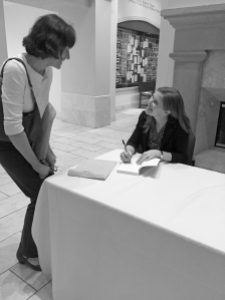Eula Biss brings fresh perspective ‘On Immunization’
DYLAN BROCKMEYER
ASST. A&C EDITOR
@dbrock08
“Immunity is a myth,” said renowned non-fiction author Eula Biss in a reading for the The Lindsay J. Cropper Memorial Writers Series at the University of San Diego. Biss spoke to students, faculty, and other spectators on Saturday, March 14 about the rising issue of child vaccination.
In her book, “On Immunity,” Biss addresses the complex social divergence which America and the world has lately been facing over the issue of whether vaccinating children is beneficial to their overall health. She is the first non-fiction writer to participate in the writing series since the program launched in 2004.
Dr. Halina Duraj, a professor in the English department at USD and the director of the Cropper Writers Series, opened the seminar and was very excited with the turnout for the program’s first non-fiction writer.
“This is our first official writer in our non-fiction series,” Duraj said. “We wanted a younger but up and coming writer that’s writing about current significant societal issues. It was really important to us to bring in someone who would connect with people who might not necessarily go to an otherwise strictly literary event.”
The writing program originally began as a way to encourage students at USD to pursue literary careers. The goal behind it was to create an air of excitement around the arts, and the Eula Biss talk was no exception. After she read a few selections from her book, she opened the floor to questions about the subject matter. She was asked about how she interpreted the increasing infant mortality rate, the public health and demographics research affiliated with early childhood vaccination, and what made her choose to begin her book with fairy tale metaphors.
Biss responded by telling of her own personal experiences. Her father was a doctor and often discussed the human body with her. Her mother told her fairy tales and greek myths and she began to draw from those a pattern about human mortality and immortality; she found a pattern of metaphors for fears of disease and vaccination that people have had for thousands of years.
“In the end, we just have to work with the knowledge we have in the moment,” Biss said. “Immunity doesn’t come without a cost, it’s a tremendous privilege. But, it’s more about something else than public health. It’s about people borrowing scientific language and taking into account that each vaccine is different; the risks and benefits differ and we need to have a competent knowledge to work with to make good decisions.”
Students at USD, like sophomore Joey Markus, enjoyed Biss’s talk and thought her unique interpretation made the subject more interesting.
“I thought it was very informative,” Markus said. “It’s interesting to see a creative writer approach a very political issue through her own personal perspective. Instead of being an essay on just facts, I liked her artist interpretation of the subject.”
Dr. Brian Clack, a professor in the Philosophy department, liked the transition between metaphor and fact.
“I thought it was beautifully done,” Clack said. “What I liked was how she said it in the context of mythology, abiding fears about disease and contagion; how that connects with fictional accounts of vampires and Grimm’s fairy tales.”
During the reception after her reading many faculty and students were impressed with Biss’s arguments and agreed that the decision to vaccinate a child rests within the personal experience of the parent. Vaccination is important for child and societal health, but it isn’t necessary to get every single vaccination for the sake of precaution. Markus was in agreement with how she structured her book.
“I agreed with the overarching thing she was trying to do,” Markus said. “Her piece is more personal than political. More the journey of a mother discovering what to do through her experiences with her child.”
Clack believed he would side in a similar way to Biss if he had to make these decisions for his own children.
“I’m not a father so I never have to wrestle with these issues about vaccinations,” Clack said. “But, if I were a father, I would reach the same conclusion that she did I think. That is, vaccination is the safest thing for all people to do.”
He enjoyed her personal touch and even though it was non-fiction, she managed to present her material in a way that made it easy for listeners or readers to relate to.
“I didn’t so much experience it as a public service broadcast,” Clack said. “As much as I perceived it as a fascinating insight into one woman’s process of thought about the best and most responsible thing to do; not only for her child, but also for society.”
Biss and the Cropper Writers Series accomplished their goals of fostering interaction and critical thinking about the creative writing field and providing students and faculty a space to discuss the difficult social and political issue of vaccination in today’s society.
